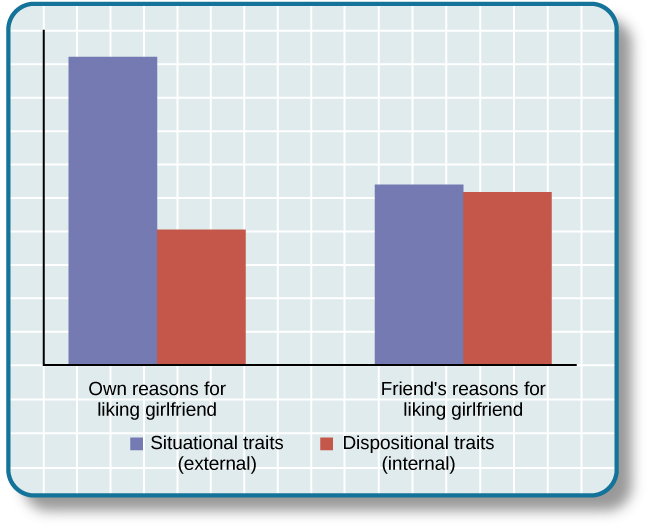| << Chapter < Page | Chapter >> Page > |
One study on the actor-observer bias investigated reasons male participants gave for why they liked their girlfriend (Nisbett et al., 1973). When asked why participants liked their own girlfriend, participants focused on internal, dispositional qualities of their girlfriends (for example, her pleasant personality). The participants’ explanations rarely included causes internal to themselves, such as dispositional traits (for example, “I need companionship.”). In contrast, when speculating why a male friend likes his girlfriend, participants were equally likely to give dispositional and external explanations. This supports the idea that actors tend to provide few internal explanations but many situational explanations for their own behavior. In contrast, observers tend to provide more dispositional explanations for a friend’s behavior ( [link] ).

Following an outcome, self-serving bias are those attributions that enable us to see ourselves in favorable light (for example, making internal attributions for success and external attributions for failures). When you do well at a task, for example acing an exam, it is in your best interest to make a dispositional attribution for your behavior (“I’m smart,”) instead of a situational one (“The exam was easy,”). The tendency of an individual to take credit by making dispositional or internal attributions for positive outcomes but situational or external attributions for negative outcomes is known as the self-serving bias (Miller&Ross, 1975). This bias serves to protect self-esteem. You can imagine that if people always made situational attributions for their behavior, they would never be able to take credit and feel good about their accomplishments.
We can understand self-serving bias by digging more deeply into attribution , a belief about the cause of a result. One model of attribution proposes three main dimensions: locus of control (internal versus external), stability (stable versus unstable), and controllability (controllable versus uncontrollable). In this context, stability refers the extent to which the circumstances that result in a given outcome are changeable. The circumstances are considered stable if they are unlikely to change. Controllability refers to the extent to which the circumstances that are associated with a given outcome can be controlled. Obviously, those things that we have the power to control would be labeled controllable (Weiner, 1979).
Consider the example of how we explain our favorite sports team’s wins. Research shows that we make internal, stable, and controllable attributions for our team’s victory(Grove, Hanrahan,&McInman, 1991). For example, we might tell ourselves that our team is talented (internal), consistently works hard (stable), and uses effective strategies (controllable). In contrast, we are more likely to make external, unstable, and uncontrollable attributions when our favorite team loses. For example, we might tell ourselves that the other team has more experienced players or that the referees were unfair (external), the other team played at home (unstable), and the cold weather affected our team’s performance (uncontrollable).
One consequence of westerners’ tendency to provide dispositional explanations for behavior is victim blame (Jost&Major, 2001). When people experience bad fortune, others tend to assume that they somehow are responsible for their own fate. A common ideology, or worldview, in the United States is the just-world hypothesis. The just-world hypothesis is the belief that people get the outcomes they deserve (Lerner&Miller, 1978). In order to maintain the belief that the world is a fair place, people tend to think that good people experience positive outcomes, and bad people experience negative outcomes (Jost, Banaji,&Nosek, 2004; Jost&Major, 2001). The ability to think of the world as a fair place, where people get what they deserve, allows us to feel that the world is predictable and that we have some control over our life outcomes (Jost et al., 2004; Jost&Major, 2001). For example, if you want to experience positive outcomes, you just need to work hard to get ahead in life.
Can you think of a negative consequence of the just-world hypothesis? One negative consequence is people’s tendency to blame poor individuals for their plight. What common explanations are given for why people live in poverty? Have you heard statements such as, “The poor are lazy and just don’t want to work” or “Poor people just want to live off the government”? What types of explanations are these, dispositional or situational? These dispositional explanations are clear examples of the fundamental attribution error. Blaming poor people for their poverty ignores situational factors that impact them, such as high unemployment rates, recession, poor educational opportunities, and the familial cycle of poverty. Other research shows that people who hold just-world beliefs have negative attitudes toward people who are unemployed and people living with AIDS (Sutton&Douglas, 2005). In the United States and other countries, victims of sexual assault may find themselves blamed for their abuse. Victim advocacy groups, such as Domestic Violence Ended (DOVE), attend court in support of victims to ensure that blame is directed at the perpetrators of sexual violence, not the victims.
Social psychology is the subfield of psychology that studies the power of the situation to influence individuals’ thoughts, feelings, and behaviors. Psychologists categorize the causes of human behavior as those due to internal factors, such as personality, or those due to external factors, such as cultural and other social influences. Behavior is better explained, however, by using both approaches. Lay people tend to over-rely on dispositional explanations for behavior and ignore the power of situational influences, a perspective called the fundamental attribution error. People from individualistic cultures are more likely to display this bias versus people from collectivistic cultures. Our explanations for our own and others behaviors can be biased due to not having enough information about others’ motivations for behaviors and by providing explanations that bolster our self-esteem.

Notification Switch
Would you like to follow the 'Chapter 15: social psychology sw' conversation and receive update notifications?